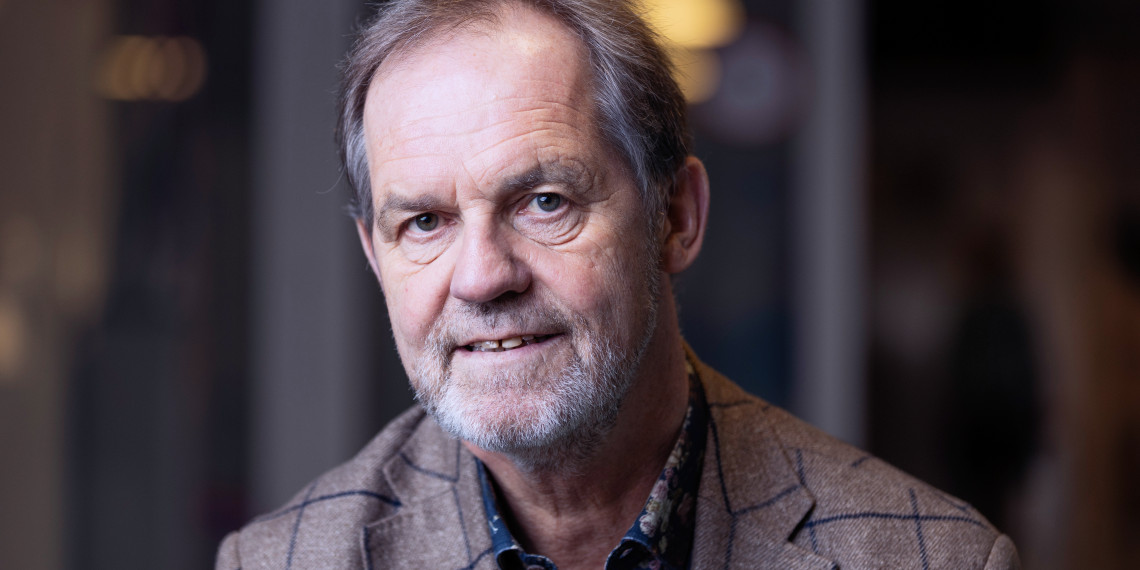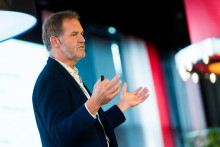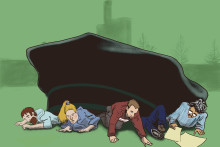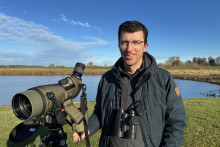'Troppo Breve' is the title of his farewell lecture. Although Van den Berg shakes out the entire saying in fluent Italian: 'La vita è troppo breve per bere vini mediocri. Life is too short to drink mediocre wine, that's the translation. You should try to spend your time doing the good stuff and enjoy it. That's what I've always tried to do.'
His farewell symposium is just around the corner. A week ago was Van den Berg's last official working day at the UT, and a day later he celebrated his 67th birthday. The symposium marks his official farewell to the UT, but the university will be anything but rid of the now emeritus professor in the near future. More on that later.
At his farewell symposium, Van den Berg will welcome luminaries such as Nobel Prize winner Ben Feringa, stem cell expert Christine Mummery and former KNAW president José van Dijck. Robbert Dijkgraaf had to cancel, but will be replaced by Detlef Lohse. 'He is the great scientific figurehead of our university, so it's fantastic that he is part of the panel discussion,' says Van den Berg.
'I was like Alice in Wonderland – and in the land of Cockaigne at the same time'
He himself has won one award and title after another: the Simon Stevin Mastership in 2002, two ERC Advanced Grants, membership of the Royal Netherlands Academy of Arts and Sciences (KNAW) and – in 2009 – the Spinoza Prize, also known as the 'Dutch Nobel Prize'. So it is not surprising that a top scientist sees himself surrounded by other top scientists. 'I feel very privileged', says Van den Berg. 'The UT gave me a lot of opportunities. And I took them where I could, I believe.’
One of those opportunities was being a member of the KNAW. 'I was like Alice in Wonderland – and in the land of Cockaigne at the same time. They are all excellent and driven top scientists. In addition, they have a great passion for their work. Whether it's plate tectonics, language, chemistry or mathematics, they are people who can captivate you for an hour when they talk about their work. That is what makes me very enthusiastic.' Through that company, several doors opened. 'The Academy has been very important in setting up the organ-on-a-chip network in the Netherlands. That's what we started together with Christine Mummery (Leiden University, later also part-time professor at the University of Twente, ed.). She said: you have the right chips, but the wrong cells. We have the right cells, but the wrong chips. So let's work together.’
And so it happened, with a network funded by the KNAW. In the years that followed, the field continued to grow and flourish, with the UT as one of the driving forces. 'Last year, an overview was made of which institute is doing best in this field. First you have MIT and Harvard, followed by the Chinese Academy of Science. And then comes Twente. In the end, we will never be able to sustain such a place, because large countries like Germany and France have the masses to push us away. But we were one of the first, have put ourselves on the map. That is something to be very proud of.'
There was once a time without top scientists and competition with Ivy League universities. As a native of Zaandam, you chose to study in Twente. What appealed to you?
'A small-scale and young university. Especially at the time. The combination of living and studying on campus really appealed to me. And the educational model; at the time, there was a more general and mixed first year. I chose to study physics, but in the first year I also had a bit of mechanical engineering, chemistry and the gamma courses around technology. It wasn't necessarily that I was looking for it, but I liked it.'
What kind of student were you?
'One that took quite a long time to complete his study. It was eight years, the first three years of which I lived on campus and later in the center of Enschede and Boekelo. Eight years was the average at the time, the 1970s. Moreover, I did quite a lot besides my studies; I was chairman of the volleyball club, worked as a student assistant and gave tutoring. But I also experienced a dip in my studies. That's all part of it, to build resilience and learn that life isn't just hurrah. But most of all, I enjoyed my student days – and the time after. I haven't regretted it for a moment.'
You then stayed at the UT for your PhD research. What was that like?
'I was able to get a place in the field of chip technology and chemistry, in the groups of David Reinhoudt and Piet Bergveld. Both are KNAW members and top professors. Then you get such an enormous schwung of how things can go in science: dynamic, going to conferences... It was a time of the sky is the limit. Looking back, it was the time of my life when I was at the peak of my intellectual and physical abilities. I even skated the Elfstedentocht, in 1986. Not because I was very well trained, but with a bit of luck I was able to participate. That was a wonderful time, but also a very different time. Nowadays, there are a lot of complaints about high workload, despite all the support and multi-year contracts. Back then, I had a one-year contract and some money to set up a conference. As a student in those years, you were trained for unemployment. I'm not complaining, but every era has its pluses and minuses.'

After his PhD, Van den Berg wanted to continue working at the UT. His wife, Trudy Vos, encouraged him to apply elsewhere, 'to open my eyes and go somewhere else'. It was Switzerland, as a researcher at the Swiss Center for Electronics and Microtechnology (CSEM) and the University of Neuchâtel. Five years later, he returned to the UT.
'You can't dwell on a disappointment for too long. Having a good set of brains helps, but what might help even more is your attitude'
Given the track record that followed, 'the rest is history' is easy to say. But Van den Berg is the first to admit that all that glitters is not gold. He could 'open a drawer of rejected research proposals', as he said before in an interview. Especially in the first few years after his return to the UT in 1993, when he focused on micro-total analysis systems (MicroTAS), the predecessor of Van den Berg's well-known 'labs-on-a-chip', he was close to despair. 'A year and a half and ten to twenty rejected proposals later, my wife said: if you believe in it, you have to persevere. Then the ball suddenly started rolling – also with the support of David Reinhoudt and Piet Bergveld. This resulted in a publication in Science, a project was awarded and we set up a conference, that is now attended by 1200 people every year.'
So not everything you touched turned to gold?
'No, certainly not. Even last year, something didn't succeed, but you don't often hear about that side of science. Look, you have to learn from the things that don't work out. And the things that do work out, you have to celebrate. You can't dwell on a disappointment for too long. Having a good set of brains helps, but what might help even more is your attitude. You have to accept that some things don't go the way you want them to. So you adapt. Survival of the fittest does not mean that the fittest will get the farthest. It's the one who knows how to adapt best.'
As a fanatic mountaineer, you have made the comparison between science and mountaineering. What do you see as reaching the top? Is that the Spinoza Prize or is it something else?
'When I look at appreciation for me and the group, a Spinoza Prize stands out. But there's more. Look there, that Wall of Fame' – Van den Berg points to a wall in his office with the covers of numerous dissertations – '81 there are, most of which I was a supervisor. These are 81 independent researchers with the same toolbox: they can all work independently, critically and in a team. They have become professors themselves, such as Loes Segerink, who takes over from me in the group, or have flown out all over the world. Such a legacy – if you can call it that – is perhaps greater than receiving an award. I believe we've created a kind of family together.'
'It's okay to be sad, but we also have to look ahead. If Line could do that, so can we'
Troppo breve. Too short. May 19, 2023 is a pitch-black page in the distinguished professor's book. Daughter Line van den Berg and her climbing partners Mats Wentholt and Jeroen van Ommen reached the summit of the Swiss Grosshorn (3754 meters) that day. Disaster strikes during the descent, when a large avalanche sets off and the entire wall starts to slide. None of the highly-experienced climbers survived the force of nature. Line van den Berg passes away at thirty years old.
How do you deal with this loss?
'Of course, we are still sad and I can be quite emotional about it. Especially when you have something beautiful to celebrate and can't share it, that's what stings the most. I'm sure I'll run into that tomorrow. At the same time, we also know that for thirty years she lived her life the way she wanted to. So we can be at peace with how she's lived her life. She was also a type of... Do you know the film Embracing the Grim...?'
'It's a film about how Line was climbing with a colleague in Scotland. Not in the snow, but in the pouring rain. And that for thirty days. But every day she goes at it with full energy. That gives us a kind of strength and motivation. We’re allowed to be sad, but we also have to look ahead. If Line could do that, so can we. We have two wonderful sons and a wonderful daughter-in-law, and we have to deal with this loss together. We can do that as a family. Line lives on in us – also in the fund we have set up for women in mountaineering. Because that's what she was fighting for. I think she would be proud of how we're doing.’

Do you also look at your work and your field with pride? Has the 'lab-on-a-chip' become what you hoped it would be in the early years?
'In the beginning, people were very much looking for a kind of killer app, something that solves everything and will be used by millions of people. That never happened with lab-on-a-chip. But that's science, isn't it? You take a route and learn as you go. It is a technology that is widely used in all kinds of areas, but not one killer app. From lab-on-a-chip, organ-on-a-chip has emerged. So no cells on a chip, but tissues. That actually has a much bigger impact and many more opportunities for the pharmaceutical industry to research new diseases. All kinds of activities were undertaken in this area, spin-offs emerged and we secured investments via the Organ-on-a-Chip Centre, a joint MESA+ and TechMed Centre initiative. It's up and running, there's a fantastic ecosystem in place.'
'I'm incredibly impatient by nature, but I also know that MESA+ wasn't built in a day'
In recent years, you have focused more and more on the climate, resulting in the establishment of the Climate Centre. What was the motivation behind this?
'Every place where there are bright minds has a responsibility to do something about the climate. We have that here at the UT, in education and research, but it's hidden. If we bring that together, we can achieve goals. We need everyone: from activists to large-scale industry. And from the social scientists who ensure that people's behaviour and attitudes change, the geoscientists who indicate where the boundaries lie to the technical people who – if something is chosen – come up with a solution. Undoubtedly, it will take pain and effort to tackle the climate challenge, but I am convinced that it can be done.'
Is the Climate Centre an ambition as the fourth research institute at the UT?
'I could say a lot about that, but I'm not going to do that. Yes, I tried. In the end, I don't care what the form is, as long as we achieve the goals. I am convinced that it is well in the minds of the executive board, the deans and the scientific directors. They have embraced the Climate Centre. And I have every confidence in Cheryl de Boer as strategic director. I don't know which way it will go, but if it sticks, continuity is guaranteed and brings people together, then it will be a success. I'm impatient by nature, but I also know that MESA+ wasn't built in a day. Life is also a matter of letting go, isn't it?'
This Friday is his official farewell, but Van den Berg is not closing the door for good yet. Supervising four PhD students, a number of conferences planned for October, his involvement in the Climate Centre and organising the first 'Climate Event'... Van den Berg calls his guest appointment a 'soft landing' for the next three years.
'There isn't a big organisation that doesn't have to go through these moments from time to time'
But it's not that this farewell interview comes too soon. ‘It's good to mark a point, and every now and then it's good to throw a party. I don't want to be someone who goes on and on and on… And that people wonder who that man is again. When I can be of value somewhere, I am happy to do so, but I leave things in very good hands. The BIOS group, MESA+, the Climate Centre... Everything is fine. An emeriti room will be set up here. Then I come and sit there a few times and chat with Jan Eijkel and Wouter Olthuis about those good old times.'
Is there something you could advice this community, especially in these financially troubling times?
'I think that's a difficult one. David Reinhoudt always said: if you can give advice for the future, then you should just go ahead and do it yourself. I'm not going to do that. I have every confidence in our community and administrators. Of course, we now have a bit of a financial bump in the road.'
A bump?
‘Okay, that's putting it mildly. It is, of course, very unpleasant and painful. But there isn't a big organisation that doesn't have to go through these moments from time to time. It's like getting sick. You can try to avoid that, but it happens to everyone in their lives. For example, I have also experienced two reorganisations at the faculty of EEMCS. If you do it respectfully and you show people that it might be in their own interest to go in a different direction, then it doesn't have to be so painful.'
'It's easy for me to say this of course, I'm incredibly privileged and I can only be grateful for my time here and the people around me. In any case, I've always tried to keep the glass half full. At the end of the day, you need to make sure your journey is beautiful, no matter what summit you're heading towards. And that you don't waste your time on bad wine.'








